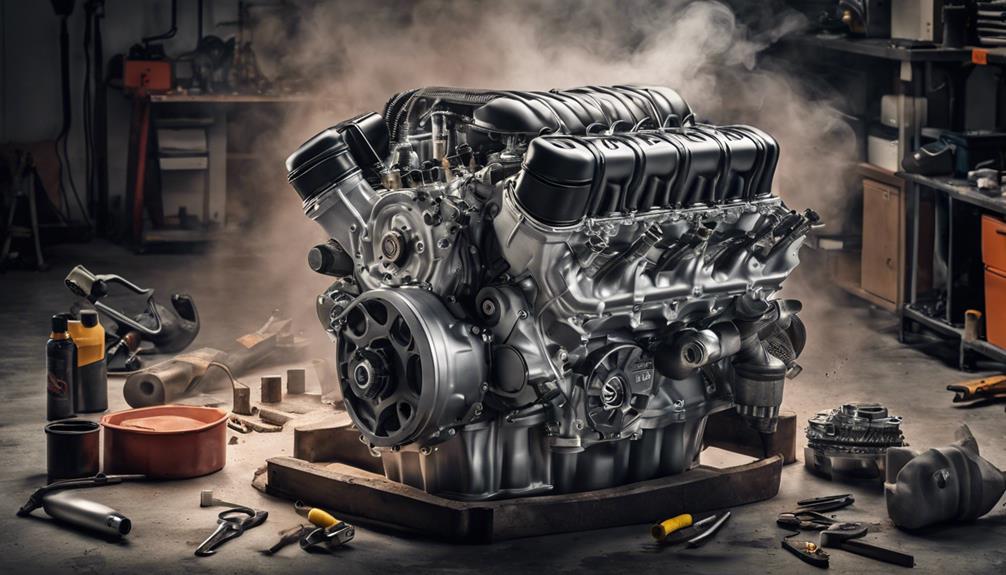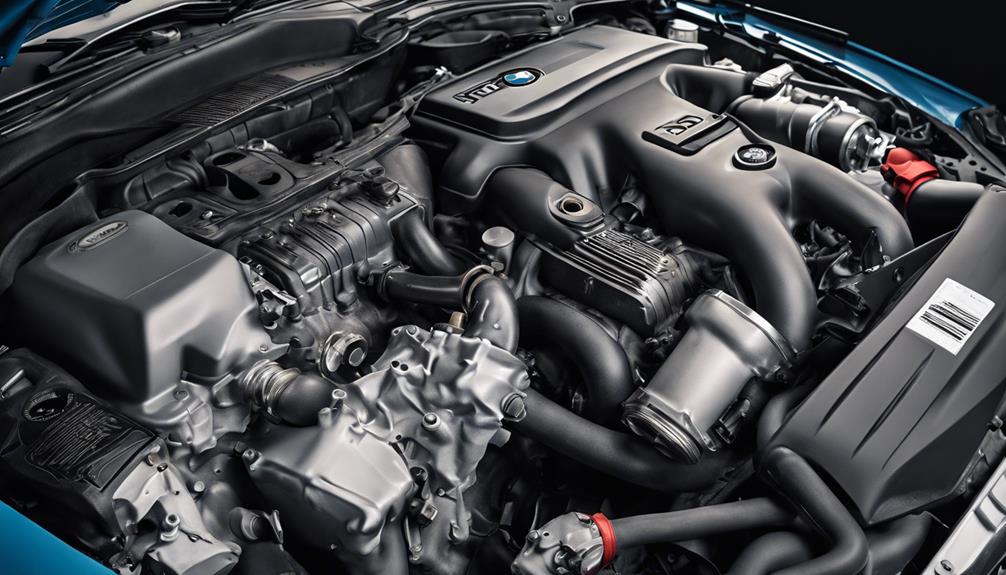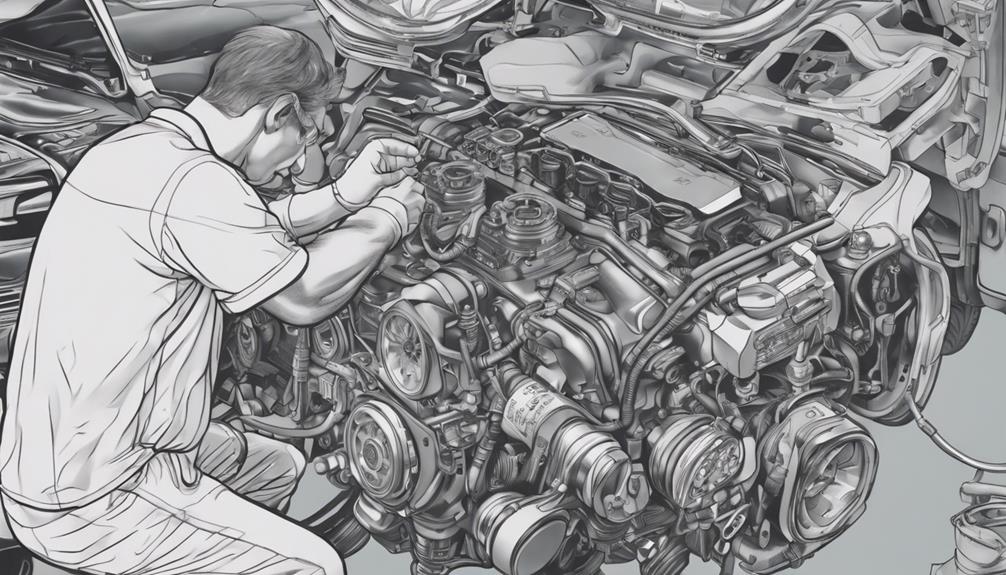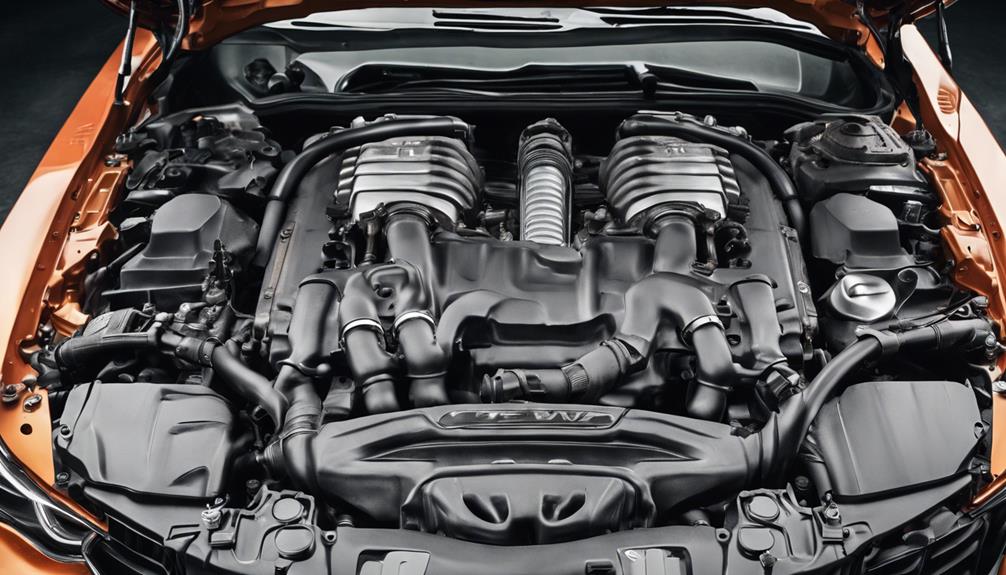If you're ready to rev up your BMW V8 engine, watch out for battery woes, as the EfficientDynamics system and turbocharger placement can lead to depletion and overheating dilemmas. BMW's upgraded 105Ah batteries aim to combat these challenges, ensuring your powerhouse keeps running smoothly. From concerns with AGM units to cooling issues, these are just the beginning of what you need to know about your BMW V8 engine's quirks!
Key Takeaways
- Turbocharger positioning in V8 engines causes overheating.
- Battery depletion due to EfficientDynamics system is common.
- Upgraded 105Ah batteries combat engine damage and fuel consumption.
- Absorbent Glass Mat units hinder efficiency and contribute to depletion.
- Newer N63 engines feature enhancements to address reliability concerns.
Battery Depletion and Recharging Challenges

Dealing with BMW V8 engine problems often involves addressing the battery depletion and recharging challenges head-on. BMW's pursuit of improved fuel efficiency with the EfficientDynamics system inadvertently led to issues with battery depletion in N63 engines. The positioning of turbochargers in the Vee of the engine caused overheating, further contributing to battery drain. To tackle this, BMW recommended replacing the battery with each oil change, a practical solution to effectively deal with the battery depletion issue.
The shift from 15,000 miles to 10,000 miles oil-change intervals was also proposed to help manage battery depletion in N63 engines. This adjustment not only keeps your engine in good condition but also aids in maintaining a charged battery. So, the next time you're due for an oil change, consider it a two-for-one special: fresh oil for your engine and a rejuvenated battery. Stay proactive, keep your engine running smoothly, and say goodbye to those troublesome battery depletion concerns.
Turbocharger Placement and Overheating
Placing turbochargers within the Vee of BMW N63 V8 engines has sparked heated concerns due to the risk of overheating issues arising from their close proximity to the engine. While turbocharger placement in this position saves space and enhances efficiency, it also brings about the pesky problem of overheating. The heat generated can lead to rapid battery depletion, creating a hot mess of issues for drivers.
Imagine cruising down the road, feeling the power of your BMW N63 V8 engine, only to be halted by overheating turbochargers. It's like hitting a speed bump on a straight highway – unexpected and frustrating. The close quarters between the turbochargers and the engine create a hot zone that can spell trouble for your vehicle's performance.
To combat this fiery dilemma, BMW has been working on improving turbocharger cooling systems for future models. So, fear not, for relief may be on the horizon. Until then, keep an eye on those turbochargers, and maybe consider packing some extra coolant, just in case.
Higher Capacity Battery Solutions

In response to persistent battery drainage issues linked to turbocharger overheating in the BMW N63 V8 engine, BMW made a significant shift from 90Ah to 105Ah batteries. This change aimed to combat engine damage and reduce fuel consumption caused by the turbochargers putting extra strain on the battery.
By upgrading to higher capacity batteries, BMW sought to provide more power to handle the increased demands of the engine, improving overall performance and longevity. These solutions offer a promising way to tackle the battery depletion challenges faced by the N63 V8 engine, ensuring a more reliable power source for your vehicle.
Issues With Absorbent Glass Mat Units
When facing challenges with Absorbent Glass Mat units in your BMW, addressing their limitations is crucial for maintaining peak battery performance. The AGM units, designed to combat battery depletion, struggle with deep discharging and recharging processes, hindering BMW's EfficientDynamics system. This inefficiency often leads to ongoing battery depletion issues, requiring costly replacements with each oil change to guarantee proper functionality.
Additionally, concerns arise regarding the long-term effectiveness of AGM units in resolving BMW's battery problems. Owners facing these challenges often encounter financial implications due to the frequent need for AGM battery replacements. Compounded by uncertainties surrounding their capabilities, the AGM units may contribute to oil leaks and deteriorating valve cover gaskets, further complicating the already intricate issue of battery maintenance in BMW vehicles.
To mitigate these concerns, staying informed about the limitations of AGM units and exploring alternative battery solutions may be beneficial in preserving your BMW's battery health.
Concerns on Newer Engine Effectiveness

You're revving towards discovering how the latest BMW V8 engines fare in the real world.
From performance to efficiency in their modern design, these powerhouses are engineered to impress.
Get ready to see how they hold up under the hood when put to the test.
Performance in Real-World
Enhancing its real-world performance, BMW's newer N63 engines tackle previous reliability concerns with innovative design and efficiency upgrades. These improvements guarantee a smoother driving experience and address key issues:
- Turbocharger Positioning: Helps prevent battery depletion problems, enhancing overall performance.
- Cooling Enhancements: Mitigate overheating risks, promoting engine longevity.
- 105Ah Batteries: Improve recharging capabilities, ensuring consistent power delivery.
- Focus on Alternator Performance: Enhances electrical system efficiency, supporting the engine's functions seamlessly.
With the launch of models like the 740i and 750i showcasing these advancements, BMW demonstrates its commitment to rectifying past engine failures for future success. Get ready for a driving experience that combines power and reliability in perfect harmony!
Efficiency in Modern Design
Efficiency upgrades in BMW's newer engine designs aim to address concerns surrounding their effectiveness, particularly in resolving battery-related issues. BMW attempted to tackle battery recharging problems with Absorbent Glass Mat (AGM) units, but these struggled with deep discharging.
Recommendations suggest swapping out the battery with each oil change to combat the challenges posed by AGM units. However, the cost implications of frequently replacing AGM batteries due to their limitations raise eyebrows.
Despite efforts like moving to 10,000-mile oil-change intervals, doubts linger over the efficacy of the solutions implemented in newer BMW engines to tackle battery depletion issues. Keeping an eye on advancements in valve and fuel pump technologies could be the key to enhancing efficiency in modern BMW engine designs.
Reliability Under Stress
When it comes to the dependability of newer BMW engines under pressure, the focus shifts towards addressing concerns surrounding overheating and battery drain, particularly due to the turbocharger placement within the Vee. Here are some key points to take into account:
- The introduction of 105Ah batteries aims to enhance the reliability of newer BMW N63 engines.
- BMW's customer care package includes parts replacements such as injectors and timing chains to improve engine performance.
- Shifting from 15,000 miles to 10,000 miles oil-change intervals is aimed at boosting the longevity of newer BMW N63 engines.
- Innovations in the design of the 4.4-liter V8 engine have been implemented to mitigate past reliability issues and guarantee effectiveness in newer models.
Oil Consumption Problems

So, you love your BMW V8, but have you noticed it's thirstier than a camel in a desert?
That's right, the N63 engine is notorious for its oil consumption issues, chugging through a quart every 750 miles.
The turbo placement in this powerplant's V configuration is like adding hot sauce to the problem, speeding up the oil-burning process.
High Oil Consumption
High oil consumption in the BMW N63 V8 engine is a notorious issue, with drivers often finding themselves adding a quart every 750 miles due to the turbochargers' strategic placement contributing to rapid burning. Here are some tips to help you tackle this oily situation:
- Monitor Regularly: Keep an eye on your oil levels to catch excessive consumption early.
- Act Promptly: If you notice high oil usage, address it swiftly to prevent potential engine damage.
- iDrive Assistance: Utilize the iDrive system that alerts you when oil levels are low.
- Cooling Concerns: Excessive oil burning can lead to overheating and gasket drying; stay vigilant to avoid complications.
Stay on top of your oil game to keep your BMW running smoothly and avoid any slippery situations down the road!
Oil Leak Issues
Experiencing oil leak issues in your BMW V8 engine can be a telltale sign of potential oil consumption problems that demand immediate attention to safeguard your engine's longevity and performance. Commonly caused by brittle valve cover gaskets and oil filter gaskets, these leaks can lead to increased wear risks and even catastrophic engine failure if left unchecked.
Regular maintenance is key to preventing oil consumption problems and preserving your engine's vitality. Detecting and repairing oil leaks early can save you from major engine troubles down the road. Ignoring these issues may result in unexpected check engine light alerts and combustion problems. Stay ahead of the game by addressing oil leaks promptly to keep your BMW V8 running smoothly.
Leaking Valve Stem Seals
Leaking valve stem seals in BMW V8 engines can turn your sleek ride into an oil-thirsty machine, causing headaches and potential damage if left unchecked. Here's why you should address this issue promptly:
- Oil Consumption Woes: Faulty valve stem seals can lead to increased oil consumption, leaving you constantly topping up your engine.
- Rubber Degradation: Over time, the rubber used in valve stem seals can harden and crack, losing its importance to seal effectively.
- Leak Troubles: Worn-out valve stem seals fail to seal properly, resulting in oil leaks that can create a mess under your car.
- Preventive Maintenance: Regular inspection and timely replacement of these seals are essential to prevent further oil consumption and avoid costly repairs down the road.
Don't let leaking valve stem seals dampen your driving experience. Stay on top of maintenance to keep your BMW V8 engine running smoothly and oil-free.
Fuel Injector Failures

Hey, you in the driver's seat! Ever felt your BMW V8 engine acting up with rough starts or misfires?
It might just be those pesky fuel injectors causing a ruckus.
Stay tuned to learn how to tackle these issues swiftly and keep your engine purring like a contented kitten.
Symptoms of Failure
If your BMW V8 engine is acting up, keep an eye out for telltale signs like rough starts, sluggish acceleration, and annoying misfires that could signal fuel injector problems. Here are some key symptoms to watch for:
- Rough Idling: Your engine may run unevenly at idle, indicating potential fuel injector issues.
- Decreased Fuel Efficiency: If you notice your gas mileage dropping unexpectedly, it could be due to faulty fuel injectors.
- Engine Stalling: Sudden engine stalling, especially when idling or accelerating, might be a sign of injector failure.
- Visible Exhaust Smoke: Excessive smoke coming from your exhaust could indicate a fuel injector problem affecting engine performance.
Monitoring these signs can help you address fuel injector problems promptly and keep your BMW V8 running smoothly.
Repair and Replacement
Addressing fuel injector failures promptly in your BMW V8 engine is important to prevent further damage and maintain peak performance.
Common issues such as rough starts, poor acceleration, and misfires are often failures due to fuel injector malfunctions.
If you notice the check engine light illuminated, it could be a sign of a faulty fuel injector.
To tackle this, replacing the problematic fuel injectors is essential to restore proper engine function and avoid potential issues down the road.
Regular maintenance and inspection play a significant role in identifying and resolving fuel injector failures early on.
Timing Chain Failures
When it comes to BMW V8 engines, timing chain failures can wreak havoc on your driving experience, causing rough running and noticeable engine vibrations. Here's why you need to pay attention to this issue:
- Check Engine Light Drama: Ignoring that little glowing light on your dashboard could lead to bigger problems down the road – literally. When your check engine light pops up, it might be trying to tell you about a potential timing chain failure. Don't ignore it; get it checked out.
- Vibrations Are Not Your Friend: Feeling like you're in a shaky massage chair while driving? Those engine vibrations could be a sign of a worn-out timing chain. Don't let the vibrations take over your ride; address the issue promptly.
- Timing is Everything: In the world of engines, timing is essential. A worn timing chain can throw off the engine's timing, affecting its performance and reliability. Keep your engine in sync by maintaining those timing chains.
- Prevention is Key: Regular maintenance and timely replacements are your best friends when it comes to avoiding costly repairs associated with timing chain failures. Stay ahead of the game and keep those chains in check!
More Frequent Battery Replacements

Experiencing more frequent battery replacements with BMW N63 engines? Well, you're not alone in this electrifying journey. The turbochargers' cozy spot can lead to overheating and a ravenous appetite for electricity, causing your battery to wave the white flag sooner than expected.
BMW, being the knight in shining armor, decided to swap out the old 90Ah batteries for heartier 105Ah ones and tighten up those oil-change intervals. But wait, there's more! To keep your ride humming at its best, BMW suggests swapping out the battery whenever you change the oil. It's like a tag team ensuring peak performance.
Enter the Absorbent Glass Mat (AGM) batteries, aiming to tackle the energy depletion dilemma. Unfortunately, these batteries struggle with the whole deep discharge and recharge routine. Fear not, BMW's got your back with a customer care package offering battery replacements during oil changes, all geared towards enhancing your engine's reliability and performance.
Maintenance Tips and Schedules
For peak performance and longevity of your BMW N63 engine, staying on top of maintenance tasks is key. Here are some maintenance tips and schedules to keep your engine running smoothly:
- Regular Maintenance: Ensure you adhere to the recommended maintenance schedule, including spark plug changes, air filter replacements, and timely oil changes. These tasks are essential for the overall health of your BMW N63 engine.
- Rust Prevention: Schedule rust prevention warranty checks to maintain the engine's longevity. Rust can greatly impact the performance of your engine if left unchecked.
- Ignition Coil Replacements: Make sure to schedule ignition coil replacements as part of your regular maintenance routine. Ignition coils play a crucial role in the engine's performance and should be replaced when necessary.
- Comprehensive Checks: Regularly check the car body for rust, air filters, parking brake lining, and flexible boot leaks. These important maintenance tasks can help prevent potential issues down the road.
Frequently Asked Questions
How Reliable Are BMW V8 Engines?
BMW V8 engines, known for power and performance, offer a thrilling driving experience. However, reliability concerns exist, necessitating regular maintenance. With proper care and attention, you can enjoy the power of a BMW V8 engine for miles to come.
What Is the Most Common Problems in Bmw's?
When owning a BMW, keep an eye out for oil consumption, leaking valve stem seals, fuel injector issues, and timing chain problems. Regular maintenance and prompt attention to these common concerns can keep your ride running smoothly.
What Are the Common Problems With the BMW N63 Engine?
When driving a BMW N63 engine, you may encounter oil consumption issues, valve stem seal leaks, fuel injector failures, timing chain problems, and fast battery depletion. Stay alert for signs of rough starts, misfires, and check engine light alerts.
What Year Did BMW Fix the N63 Engine?
In 2013, BMW addressed N63 engine issues by introducing improvements like revised turbochargers, cooling systems, and components. They extended warranties on certain parts. You could benefit from retrofitting these changes if you have an earlier N63 model.









